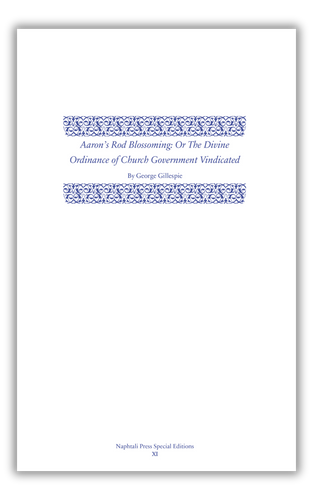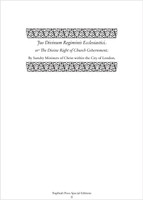Description
George Gillespie’s first book, the anonymously published Dispute against the English Popish Ceremonies, propelled him to the forefront of the Second Reformation of the Scottish Kirk. He was then appointed to be an ecclesiastical commissioner to attend the Westminster Assembly of Divines in London. There he produced his most famous work, Aaron’s Rod Blossoming, in order to refute the Erastians, who argued for church subordination to the civil government. Gillespie divides his treatise into three sections: (1) “Of the Jewish Church Government,” (2) “Of the Christian Church Government,” and (3) “Of Excommunication from the Church, and of Suspension from the Lord’s Table.”
This new edition was created by comparing the texts of 1646 and 1844. The bibliography contains over six hundred entries, and all references have been traced. An exhaustive index is provided for all the Scripture references and authors cited, and the many Latin quotations have been translated in the notes. With the publication of this title, all of George Gillespie’s works now will have appeared in new critical editions.
Contents
Preface
The Original Contents with Chapter Summaries
To the Reverend and Learned Assembly of Divines Convened at Westminster
To the Candid Reader
Book One: Of the Jewish Church Government
Book Two: Of the Christian Church Government
Book Three: Of Excommunication from the Church and of Suspension from the Lord’s Table
Bibliography
Scripture Index
Author Index
Endorsements
“In this remarkably able and elaborate production, Gillespie took up the Erastian controversy as stated and defended by its ablest advocates, fairly encountering their strongest arguments and assailing their most formidable positions in the frank and fearless manner of a man thoroughly sincere and thoroughly convinced of the truth and goodness of his cause.”
—William M. Hetherington, History of the Westminster Assembly
“[George Gillespie] distinguished himself as a defender of the Reformed ideal of the church in conflict with the leading Erastians, Selden and Coleman. He excelled as a ready debater. It was during the years that this assembly sat that the youthful divine produced his masterpiece in defense of the freedom of the church to carry out the will of its Head and Lord. This learned treatise goes by a name that bears the hallmark of the age. It is Aaron’s Rod Blossoming. In it we have an exhaustive discussion of the questions at issue between the Erastians and the Orthodox. It is the recognized classic of Scottish Reformed theology in its own department.”
—John MacLeod, Scottish Theology
“Aaron’s Rod Blossoming is George Gillespie’s magnum opus, and it accomplishes three ends. First, Aaron’s Rod argues from the Old and New Testaments that Christ’s church has a government distinct from the government of the state. Second, the book demonstrates that Christ intends a particular government for the church. Elsewhere Gillespie defends a presbyterian form of church government. Here he proves, against Erastians of all sorts, that the church must establish a form of church government according to the rules of God’s Word. Third, Aaron’s Rod demonstrates that the church must engage in church discipline and must protect itself by fencing the Lord’s Table. This volume represents an accessible but scholarly reproduction of a classic presbyterian work. Read it, and you will be reminded why seventeenth-century books on ecclesiology remain the go-to resources for pastors and theologians seeking to understand the basic building blocks of biblical church government.”
—Chad Van Dixhoorn, professor of church history and theology, Reformed Theological Seminary, Charlotte, North Carolina
About the Author
George Gillespie (1613–1648) was a member of the Westminster Assembly of Divines and, although its youngest member, was respected for his learning, zeal, and sound judgment resulting in his essential assistance to the preparation of the Directory and Confession of Faith. He presented the Confession of Faith to the General Assembly in 1647, obtaining its ratification. In 1648 he was elected moderator of the assembly, but the pressures of the position probably led to his death later that year.
About the Series Editor
Chris Coldwell has published fine-quality editions of Puritan, Presbyterian, and Reformed literature for over thirty years through Naphtali Press. He is also the general editor and publisher of The Confessional Presbyterian journal.







